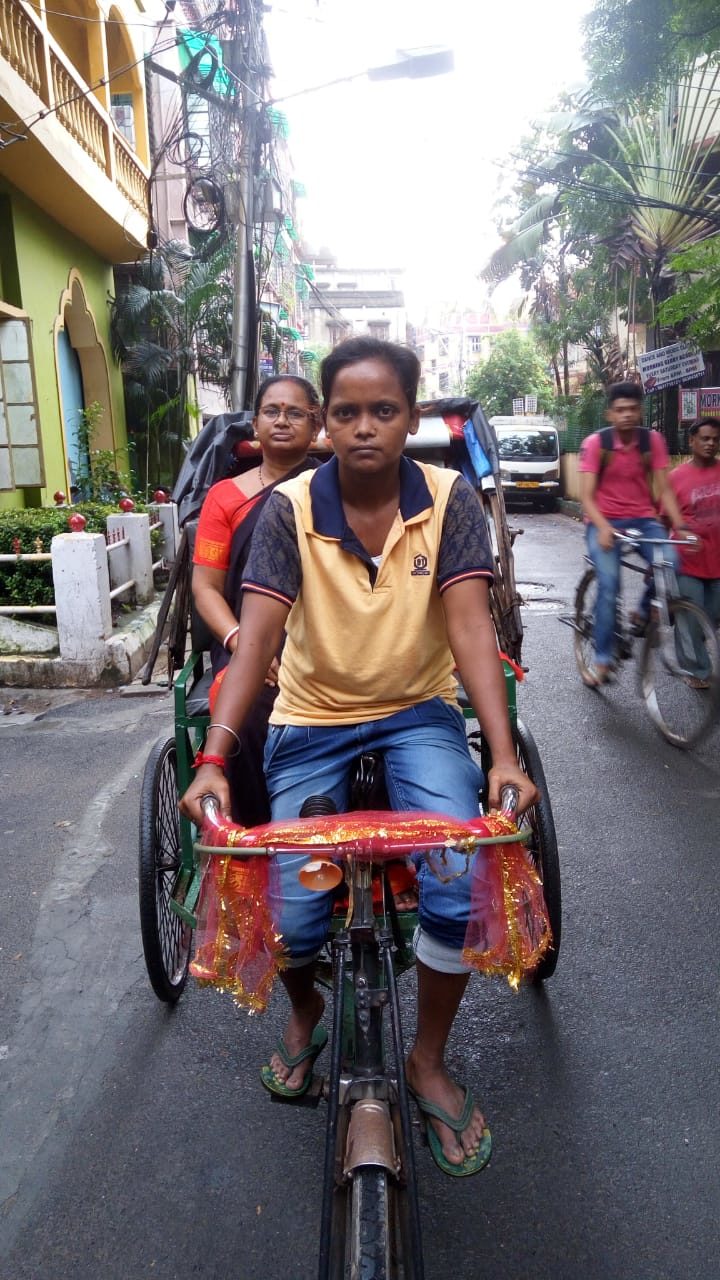She lives in a narrow dingy alley in one of the city’s eastern fringes. A sharp descent in societally determined neighbourhood aesthetics is noticed as one enters the alley and is greeted by the sight of a rickshaw or two arbitrarily parked at a corner further cramming the alley already starved for space.
However one does not know how this very rickshaw, a sight incapable of beating any other in a competition for mundaneness, has made Shonali Ghosh of Kolkata’s Kasba area a name that stands out of the ordinary. Not every woman aged 29 belonging to a social stratum with daily struggles for survival has the gumption to work three kinds of job each day, manage a household and provide for an ailing mother with a meagre wage of not more than Rs 3000.
Her day starts at six in the morning with lending services at two consecutive households where she works as a domestic help. By nine she is out on the road with her rickshaw ferrying passengers only to help at two more houses between two to four. Lunch and rest are an hour long affair only for Shonali who has to rush again to sell corn cobs at a nearby park. After she returns home from her hours of daily toil, her legs give way. “I have to tie my legs tightly with a cloth so that I can sleep when the cramps get too crippling”, she says.
Having two younger siblings to care for, Shonali had to leave school while she was in the fourth standard. She learnt how to drive a rickshaw from her father who drove the three-wheeler by profession.
“I would paddle it on my own and sometimes despite my father getting annoyed take it away to ride to my friends’ houses,” she says with a grin. After her father passed away in 2013, and her mother took ill from a deadly case of Hepatitis B, the burden of the entire family fell on Shonali and what could have come in handier than a small skill she had playfully learnt back in her childhood. From then, she took to this profession, one commonly associated with the domain of male proficiency.
She knows she has to earn money, especially to cure her ailing mother. Her brother, the only prospective earning member, moved out with a family of his own too big to use his earnings to support his mother and sister. Having incurred some debts for her sister’s marriage and education all of which she single-handedly managed, Shonali’s only hope now is to cure her mother and aim for a more stable job. “My only future plans now are my mother and a good enough job for sustenance.”
Though the rickshaw has earned Shonali support from different corners of the society, life as a female rickshaw puller isn’t easy. Stigma is a well prevalent thing in the profession that remains a dominantly male bastion. “I tie my hair in a bun so that people don’t quickly recognise me as a woman. Also I don’t park at any particular stand. I keep on moving and pick passengers along the way”, says the undaunted rickshaw-driver clad in a tee and jeans folded up to her knee.
Shonali wasn’t “allowed” by male rickshaw-pullers to park her rickshaw in a “stand” – it offers opportunities to ferry passengers by turn and could have given her an assured income. “The male rickshaw-pullers look at me as a alien creature. I don’t know why they laugh. Male passengers and rickshaw-pullers laugh at me – ‘oi dyakh ekta meye rickshaw chalachhe’ (look! a woman is driving a rickshaw), they say,” Shonali says.

